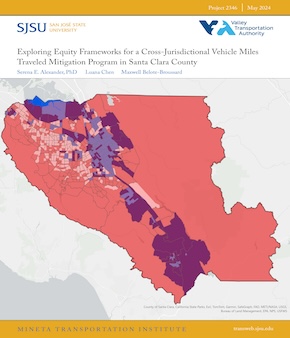- 408-924-7560
- mineta-institute@sjsu.edu
- Donate
Exploring Equity Frameworks for a Cross-Jurisdictional Vehicle Miles Traveled Mitigation Program in Santa Clara County
The Santa Clara Valley Transportation Authority (VTA) partnered with a Mineta Transportation Institute (MTI) research team and San José State University (SJSU) students for assistance in developing the equity framework for the agency’s proposed Equitable Vehicle Miles Traveled (VMT) Mitigation Program. The goal of the program is to reduce the amount of driving generated from new developments in Santa Clara County through transportation solutions with equity and cross-jurisdictional collaboration in mind. During the Fall 2023 semester, graduate urban planning students from SJSU worked to develop policy recommendations for the program equity framework through a literature review, spatial analysis, community engagement observations, and stakeholder interviews. This report summarizes and builds upon student contributions to present a set of equity-focused recommendations for VTA to consider for program development, implementation, and evaluation. Notable strategies identified for developing the framework include defining VMT equity with local relevance, creating an accountability plan, and embedding equity into key decision-making points. Additionally, a transportation challenge frequently mentioned by stakeholders was a need for improved transit availability, frequency, reliability, and speed. Major recommendations discussed in the report include developing and adopting a localized definition of VMT equity, developing an informative and implementable accountability plan, embedding equity measures into project prioritization and evaluation processes, and prioritizing improvements to public transit. Lessons learned can help other jurisdictions develop and implement equitable VMT mitigation programs and effective community engagement processes. Additionally, the report provides an overview of the factors that go into program development, which can help readers better understand this process and identify areas where they can get involved.
SERENA ALEXANDER, PHD
Dr. Serena Alexander is an Associate Professor of Public Policy and Environmental Engineering at Northeastern University. Her research predominantly focuses on developing and implementing cutting-edge strategies to address climate change and the environmental impacts of transportation. In 2022, Dr. Alexander joined the U.S. Department of Transportation (USDOT) Climate Change Center (CCC) and the Office of the Under Secretary as a Visiting Scholar, where she provided leadership and research on the development of policy centered around all major transportation issues, such as infrastructure development, climate, innovation, and equity. She has published several peer-reviewed journal articles and technical reports and presented her research at national and international conferences. She has also established the American Collegiate Schools of Planning (ACSP) and Association of European Schools of Planning (AESOP) collaboration platform, focusing on climate justice and best practices of climate action planning. Dr. Alexander has worked with many multidisciplinary teams and aims at bridging the gaps between technical knowledge, policy decisions, and community values. She received her doctorate in Urban Studies (Specialization in Urban Policy and Development) from Cleveland State University. She also holds master’s degrees in Urban and Regional Planning from California State Polytechnic University, Pomona, and Architecture from Azad University of Tehran.
LUANA CHEN
Luana Chen is a graduate student in the Urban and Regional Planning program at San José State University. She received her bachelor’s degree in Sociology and Political Science: Public Service from the University of California, Davis in 2019. Her research interests include transportation and land use with attention to equity and sustainability. Her career goals involve contributing to a better-connected, equitable, and sustainable multi-modal transportation network for the San Francisco Bay Area.
MAXWELL BELOTE-BROUSSARD
Maxwell Belote-Broussard is a graduate student in the Urban and Regional Planning program at San José State University. He received his bachelor’s degree in Geography and Environment from Sonoma State University in 2021. Maxwell gained a passion for geographic informations systems in his undergraduate program and continues to utilize those skills in his graduate work and other applications to this day. His career goals involve creating and refining connected multimodal transit systems to improve the health and safety of the communities they link.
-
Contact Us
San José State University One Washington Square, San Jose, CA 95192 Phone: 408-924-7560 Email: mineta-institute@sjsu.edu






